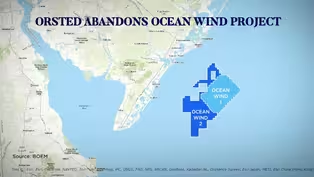NJ Spotlight News
Seafood products made with forced labor, investigation finds
Clip: 11/2/2023 | 6mVideo has Closed Captions
Interview: Ian Urbina, The Outlaw Ocean Project
The Outlaw Ocean Project spent four years investigating human rights abuses at sea and on land in the Chinese seafood industry, culminating in a report published last month that detailed how the issues overseas touch the fish that often ends up on dinner plates in New Jersey and around the nation.
Problems playing video? | Closed Captioning Feedback
Problems playing video? | Closed Captioning Feedback
NJ Spotlight News is a local public television program presented by THIRTEEN PBS
NJ Spotlight News
Seafood products made with forced labor, investigation finds
Clip: 11/2/2023 | 6mVideo has Closed Captions
The Outlaw Ocean Project spent four years investigating human rights abuses at sea and on land in the Chinese seafood industry, culminating in a report published last month that detailed how the issues overseas touch the fish that often ends up on dinner plates in New Jersey and around the nation.
Problems playing video? | Closed Captioning Feedback
How to Watch NJ Spotlight News
NJ Spotlight News is available to stream on pbs.org and the free PBS App, available on iPhone, Apple TV, Android TV, Android smartphones, Amazon Fire TV, Amazon Fire Tablet, Roku, Samsung Smart TV, and Vizio.
Providing Support for PBS.org
Learn Moreabout PBS online sponsorshipa new investigation is revealing the crimes behind the seafood you eat and how much of the fish that ends up on your dinner plate got there by way of what are essentially floating slave ships the investigation by The Outlaw ocean project exposes China's rampant use of forced labor within the global Seafood industry and deeply rooted human rights violations as China Remains the leading supplier of seafood to the US and Europe including places in New Jersey but many of their fishing vessels are dependent on workers who are forced into a debt bondage they can't escape journalist Ian urbina has covered this issue for years he and his team reported from both land and sea for this investigation to offer a firsthand account of the conditions on these ships and what's propelling slavery on fishing boats he joins me now Ian urbina um Wow first of all thank you for sharing this reporting with us you write extensively about um what you say are human rights abuses that are rampant aboard these vessels um just how big of an issue is this in the maritime industry you know so distant water fishing vessels are those fishing vessels that are on the high seas they stay at sea for a long time whether those are Chinese or South Korean or Taiwanese um these vessels have a big problem with human slavery and trafficking and violence on crew it's a fairly Global problem I mean and a lot of this most of this is ending up on the dinner plates of Americans how many we know that there are at least 10 importers in New Jersey that through your investigations linked to some of these ships that have these human rights concerns how vast though throughout the United States just how many consumers are getting these products on their dinner table that as you write are caught by slaves yeah I mean if you think of seafood ponder it on the water on the fishing vessels but also in the processing plants and we looked at China in particular so there are two Realms in which force labor is happening most of the world seafood goes through either from Chinese vessels or through Chinese processing plants including hundreds of brands that come into the US and in the factories and on the ships a lot of force laborers use so we're dealing with you know several dozen Brands and grocery stores and restaurants that have seafood that's been processed by force labor talk a little bit more en if you can just about life aboard one of these ships if you are um one of these really indentured workers yeah we looked at Chinese squid ships in particular which are especially brutal ones these are jiggers they usually 40 men on a ship five officers they stay at sea for about two years uh and they sort of Traverse the entire Globe work days tend to run 15 hours a day six to seven days a week often they're working in the freezer you know for 10 hours straight and they don't have gear if they're up on Deck then they're dealing with really really brutal cold and water coming aboard heavy equipment so it's it's pretty tough work malnutrition is a huge problem they run out of fresh vegetables and meat pretty quickly so you have a lot of guys dying from severe Mount nutrition do they ever attempt to leave uh to get off of these ships are they able to they do you know there's this case just recently about a month and a half ago where a bottle washed up on shore in Uruguay and in the bottle there was a message that said SOS I'm being HED against my will could someone please rescue me and they named the ship it was a Chinese squid [ ó_ó_ ] you know there have been mutinies and Strikes in a bunch of places around the world on these ships they turn violent they often turn deadly sometimes the ships are run around into the port so that the guys can try to get off um so violence happens and escapes do happen as well what's driving all of this though because as you wrote and after your investigation there's a whole economy here there are essentially bounty hunters that go and look for these folks if they do try to escape they get paid there are other uh people who help with their transportation in searching for uh any of these escapes we'll say they also get paid I mean there's a whole ecosystem of people involved in this and I wonder what's driving the need for all of this uh you know far Siege fishing yeah I mean you know Seafood is the last form of wild protein left on the planet um it's a it's a multi-billion dollar industry the most expensive component in doing fishing like distant water fishing is your labor so there's a sort of incentive to try to cut corners on that cost fuel ship labor um are the big cost so if you can find a way to get cheap workers and keep them on board longer work them harder then that's just a little bit more for your profit what has happened since we know that uh New Jersey Congressman Chris Smith recently held a hearing you testified as part of that it seems as though there are efforts to uh rein in these practices and also put sanctions on them but are they working not yet they're not working yet but there there has been a lot of movement in the last month since we published uh like you said there was a congressional White House hearing um there were EU Parliament hearings uh there's some litigation in the pipeline so it's gotten a lot of attention partially because some of the purchases are by the US government and then a lot of the purchases are in the public space with big companies and those companies realize now that they can't look away from the problem uh all of this reporting of course can be found online Ian arbina is the founder and director of The Outlaw ocean project Ian thank you so much thanks for having me
The focus is on civil liberties for some voters
Video has Closed Captions
Clip: 11/2/2023 | 4m 20s | Hot-button social issues are driving some people to the polls (4m 20s)
Program to help people in mental crisis for Hunterdon Co.
Video has Closed Captions
Clip: 11/2/2023 | 1m | The program pairs mental health specialists with police (1m)
Public housing residents in AC decry poor living conditions
Video has Closed Captions
Clip: 11/2/2023 | 4m 16s | A lawsuit filed a year ago prompted some repairs (4m 16s)
Supporters still bullish on NJ offshore wind despite Ørsted
Video has Closed Captions
Clip: 11/2/2023 | 4m 40s | But delays expected, and prospect of price hikes (4m 40s)
Providing Support for PBS.org
Learn Moreabout PBS online sponsorshipSupport for PBS provided by:
NJ Spotlight News is a local public television program presented by THIRTEEN PBS















